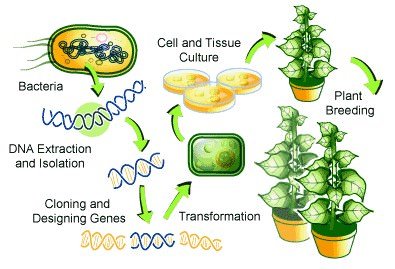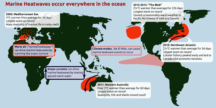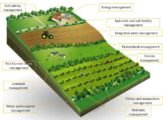
Genetically Modified Crops (GM Crops): Benefits & Controversies
Subscribe to Never Miss an Important Update! Assured Discounts on New Products!
Must Join PMF IAS Telegram Channel & PMF IAS History Telegram Channel
Last updated on April 25, 2024 11:22 AM
Genetically Modified Organism (Transgenic Organism)
- In GMO, genetic material (DNA) is altered or artificially introduced using genetic engineering techniques.
- Genetic modification involves the mutation, insertion, or deletion of genes.
- Inserted genes usually come from a different organism (e.g. In Bt cotton, Bt genes from bacterium Bacillus thuringiensis are induced).
- Genetic modification is done to induce a desirable new trait which does not occur naturally in the species.
GM techniques are used in:
- Biological and medical research,
- Production of pharmaceutical drugs,
- Experimental medicine (e.g. gene therapy),
- Agriculture (e.g. golden rice, Bt cotton etc.),
- Genetically modified bacteria to produce the protein insulin,
- To produce biofuels from some GM bacteria, etc.
Genetically modified crops (GM Crops or Biotech Crops)
- They are the plants used in agriculture, whose DNA has been modified to induce a desired new trait.
- A New trait might help in
- Controlling certain pests, diseases, or environmental conditions,
- reduction of spoilage,
- inducing resistance to chemical treatments (e.g. resistance to an herbicide),
- improving the nutrient profile of the crop,
- atmospheric nitrogen fixation by cereal crops,
- inducing tolerance to high salt soils and to flooding in crops,
- inducing drought resistance in crops,
- prolonging shelf life and commercial value of fruits and vegetables.

Major GM Crops
Bt Cotton
- Bt cotton is insect-resistant cotton variety.
- Strains of the bacterium Bacillus thuringiensis produce different Bt toxins.
- Bt toxins are insecticidal to the larvae of moths, bollworms, etc. but are harmless to other forms of life.
- In 2002, a joint venture between Monsanto and Mahyco introduced Bt cotton to India.
Advantages
- Increases yield of cotton due to effective control of three types of bollworms.
- Reduction in insecticide use in the cultivation of Bt cotton in which bollworms are major pests.
- Potential reduction in the cost of cultivation (depending on seed cost versus insecticide costs).
Problems with Bt Cotton
- High cost of Bt cotton seeds as compared to non Bt cotton seeds.
- Ineffective against sucking pests like whitefly.
- Whitefly attack has become rampant in Punjab, Haryana and elsewhere.
- The costs of Bt seed and insecticide increase the risk of farmer bankruptcy in low-yield rain-fed settings.
Bt Brinjal
- Brinjal is India’s second most consumed vegetable after potatoes.
- Bt brinjal is created by inserting a crystal protein gene from the soil bacterium Bacillus thuringiensis.
- The Bt brinjal has been developed to give resistance to the Brinjal Fruit and Shoot Borer (FSB).
- Mahyco has developed the Bt brinjal variety.
- Insecticide requirement for Bt brinjal is far less than its non-Bt counterpart for the control of FSB.
- The Genetic Engineering Appraisal Committee (GEAC) cleared Bt brinjal for commercialization in 2009.
- Following concerns raised by some scientists and anti-GMO activists, the GOI has imposed a moratorium on its commercial use (not a permanent ban).
- Mahyco’s Bt brinjal is commercially grown in Bangladesh.
Golden rice
- Golden rice is a variety of rice (Oryza sativa) produced to biosynthesize beta-carotene, a precursor of Vitamin A, in the edible parts of rice.
- It is mostly consumed in areas with a shortage of dietary vitamin A.
Benefits of GMO
Crops
- Enhanced taste and quality.
- Reduced maturation time.
- Increased nutrients, yields, and stress tolerance.
- Improved resistance to disease, pests, and herbicides.
- New products and growing techniques.
Animals
- Increased resistance, productivity, hardness, and feed efficiency.
- Better yields of meat, eggs, and milk.
- Improved animal health and diagnostic methods.
Environment
- “Friendly” bioherbicides and bioinsecticides.
- Conservation of soil, water and energy.
- Bioprocessing for forestry products.
- Better natural waste management.
Society
- Increased food security for growing population.
Issues Surrounding GMO

Safety
- The adverse impacts of genetically modified food are not evident immediately.
- Potential human health impact: allergens, transfer of antibiotic resistance markers, unknown effects.
- Potential environmental impact: unintended transfer of transgenes through crosspollination, unknown effects on other organisms (e.g., soil microbes) and loss of flora and fauna biodiversity.
- Criticism against Anti-GM lobby: Instead of evaluating the risks, costs and benefits of hybrids on a case-by-case basis, they propose a blanket ban on genetic modification.
Access and intellectual property
- Domination of world food production by a few companies.
- Increasing dependence on industrialized nations by developing countries.
- Biopiracy — foreign exploitation of natural resources.
Ethics
- Violation of natural organisms’ intrinsic values.
- Tampering with nature by mixing genes among species.
- Objections to transferring animal genes in plants and vice versa.
Labelling
- Not mandatory in some countries (e.g. United States).
- Mixing GM crops with non-GM confounds labelling attempts.
Research
- The objectivity and authenticity of scientific research and publication.
Effectiveness
- The ineffectiveness of BT cotton against whitefly attack in Punjab and Haryana has raised more questions.
Issues with banning GM crops
- The ban on GM crops is also promoting an illegal market to flourish in India.
- Bangladesh is reaping the benefits of Bt Brinjal while its cultivation is banned in India.
GMO have already entered the food chain
- Cotton seed oil extracted from Bt cotton plants is being consumed in Gujarat and Maharashtra.
- Soybean oil is extracted from imported seeds, which are produced from GM crops abroad.
Illegal cultivation (Farmer’s rights vs. Government Regulation)
- A farmers’ group in Maharashtra, marked its protest against the government ban on genetically modified (GM) crops by planting Bt brinjal and HT cotton.
- There is a grave danger of illegal genetically modified brinjal cultivation proliferating.
Last updated on April 25, 2024 11:22 AM

















